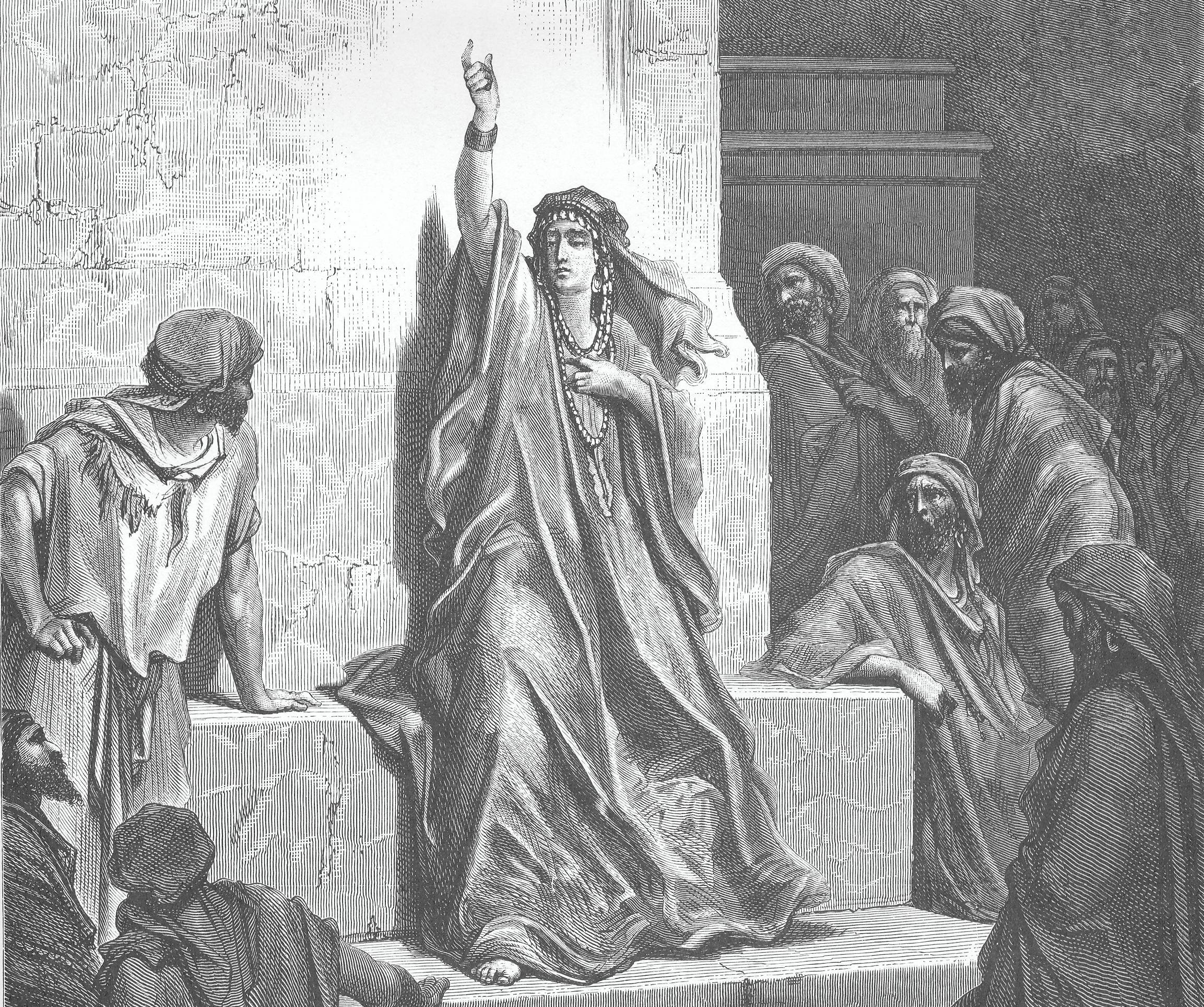“Jesus” and Barak
*Jesus is in scare quotes because that’s not his name. Most Christians know this but err on the side of (English-speaking) tradition rather than Biblical consistency; Ἰησοῦς is Joshua in the Old Testament but “geez-us” in the New? No. It matters to get the name of the Son of God right.
I’ve been off the exegetical kick for awhile what with all the transition, so I recently decided to take some time to dig into a seemingly minor thing that’s been tumbling around my brain. Specifically, I’ve been interested in the etymology of Nazareth and how it seems to imitate a subtle detail from one of Israel’s earliest war stories… So let’s talk about “Jesus” and Barak. Not the 44th president of the United States, but the prophet Deborah’s commander-in-chief.
Deborah praises Jael, by Gustave Doré.
The book of Joshua tells of the capture and (re)distribution of the Promised Land (AKA Canaan) by its namesake, the son of Nun. In Judges, the victory must be repeated when Barak, a Naphtalite, is placed under the command of the prophet Deborah to fight “Jabin, king of Canaan”. (Judges 4:2) Barak is called “the son of Abinoam from Kedesh-naphtali.” (4:6) Kadesh was a Levitical sanctuary city within the newly established boundaries of the tribe of Naphtali. The city’s Hebrew name, Qeḏeš, derives from qāḏaš, a primitive verb that means to bless or make holy. Most tribes had been given land, but not the priestly Levites. The bearers of holiness were given charge of six cities of refuge where mercy ruled rather than strict justice.
Qeḏeš/Kadesh is emphasized as the hometown of Barak, the son of Abinoam and famed military leader. His victory over Canaan serves as a reiteration and restoration of what God had done through Joshua, the son of Nun and even more famous military leader. Canaan and Sisera are stand-ins for everything that is foreign to Israel and to God’s blessing. In contrast to Barak, from the holy (qāḏaš) city in Naphtali, the Canaanite general “lived in Harosheth-hagoyim”, (4:2) literally a place built, made (ḥărōšeṯ) of (ha) Gentiles. The goyim of the Bible are those forces against which Israel is in constant contention.
Barak is therefore not just the mythic champion of Israel, he is also the symbolic representation of everything that is blessed and holy. Sisera, on the other hand, represents anything and everything against which God’s forces are arrayed. Their hometowns are integral to the symbolism that the Bible sets up. With that in mind, it matters where Joshua, the son of God, came from.
Archeological evidence suggests human habitation of the village in which “Jesus” was raised began as early as the Bronze Age. There is no record of its name, however, until after P(s)aul’s writings are already being circulated within proto-Christian communities. Mark’s gospel, composed no earlier than the sixth decade C.E., is the first to name the village that served as home to the Son of God, who apparently “came from Nazareth of Galilee”. (Mark 1:9)
Nazareth is another linguistic bastard, just like “Jesus.” The Greek word that Mark creates, nazara (G3478), is based on the Hebrew word nāzar (H5144), a primitive verb that means to consecrate or make holy. Either Mark is the first to give the village its name or he is recalling it from another source, such as a local oral tradition. In Greek, to make a noun from a verb or adjective required the addition of the suffix -ites (i.e. Canaanites, Amalekites, Israelites, etc.). If “Nazara” was in fact the name used by locals, then gentiles would have instinctively called its inhabitants Nazarites. But the Jews of the area would have preferred something else, since Numbers 6 gives very specific parameters for anyone wishing to become a Nazarite. Mark writes in Greek to a Jewish audience, so he creates another noun for the people "of Nazareth” (apo Nazara) to avoid confusion. He calls them all nazarēnos (G3479, Mark 1:24), which is then Anglicized as “Nazarene.” He, or whoever decided the village’s name, clearly had a distinct brand of holiness in mind.
Notice how Mark picks up on the Biblical pattern of couching a city within its wider region; Kadesh-naphtali, Harosheth-hagoyim, Nazareth of Galilee. When a region was held in high esteem in the Israelite imagination it carries its tribal nomenclature, as in Barak’s case. But after ten of the northern most tribes split from the Davidic royal line, their luster dimmed and its people and land were seen with contempt. It didn’t matter that Naphtali (Barak’s tribe) and Zebulun (home to Nazareth) were the troop tribes of Israel, the prophet Isaiah gave their lands a new name, gālîl hagôyim (Isaiah 9:1), “the district of gentiles,” AKA the region of non-Jews.” The name stuck, and the prophetic pejorative is where the Greeks got the name Galilee. If it sounds familiar, it’s the same construction used in Judges for Sisera’s land, Harosheth-hagôyim.
The son of God, like Barak, emerges from a holy city as a military commander tasked with restoring YHWH’s promise to (humanity through) Israel. Unlike Barak, “Jesus” would not enjoy (the appearance of) victory over the forces arrayed against God. As a poor bastard child of low birth and questionable social status, he was “of Galilee” and treated as an outsider by religious elitists from the south. The temple economy and its proclivity for corruption was obvious to rural devotees whether they descended from the exiled Davidic line or the impoverished Samaritans who had remained in the promised land without interruption. Barak and “Jesus” were skilled military leaders from ‘holy’ cities, but as northerners, either by birth or residence, both would have been looked down upon within the socio-religious establishment of first century Judaism. Funny how religion seems to have selective memory for its soldiers and veterans, huh?

